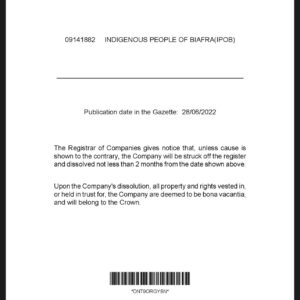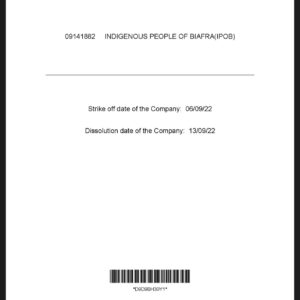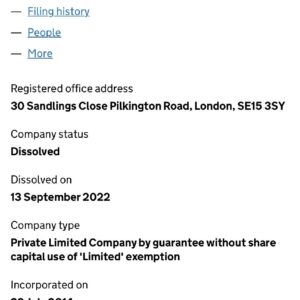The Indigenous People of Biafra (IPOB) has been dissolved and struck off as a registered company in the United Kingdom.
IPOB was founded in 2014 by Nnamdi Kanu.
He also established it as a corporation in the United Kingdom.
Kanu, who is the leader of IPOB and a UK citizen, has been detained by the Nigerian government since June 2021 when he was extraordinarily renditioned to Nigeria from Kenya.
In October, a three-member panel of the appeal court led by Justice Hanatu Sankey, held that the Federal Government flouted the Terrorism Act and breached the rights of Kanu when he was forcefully brought back to the country.
The court, therefore, discharged Kanu of the terrorism allegation. However, the Minister of Justice and Attorney-General of the Federation, Abubakar Malami, said Kanu was only discharged but not acquitted.
The company was dissolved on September 13, 2022, after warnings.
“The Registrar of Companies give notice that, unless cause is shown to the contrary, the company will be struck off and dissolved not less than 2 months from the date shown above.
“Upon company’s dissolution, all property and rights vested or held in trust for the company are deemed to be bona vacantia, and will belong to the Crown,” a notice sent to IPOB on June 28, 2022, read.
Earlier in the year, the UK barred IPOB, the Movement for the Actualisation of Sovereign State of Biafra and other Biafran groups from participating in its asylum programme.
The British government noted that IPOB had been proscribed as a terrorist group by the Nigerian government and that members of the group and its paramilitary wing – the Eastern Security Network – have reportedly committed human rights violations.
The UK, therefore, said that persons who commit human rights violations must not be granted asylum.
The UK Visas and Immigration in March 2021 released new guidelines to its decision-makers on how to consider and grant asylum applications to IPOB members.
In the guidelines titled, ‘Country Policy and Information Note Nigeria: Biafran secessionist groups,’ the UKVI, a division of the Home Office, directed its decision-makers to consider if a person “who actively and openly supports IPOB is likely to be at risk of arrest and detention, and ill-treatment which is likely to amount to persecution.’’
However, in its update published on its website on May 3, titled, ‘Country policy and information note: Separatist groups in the South-East, Nigeria,’ the UKVI said, “IPOB is proscribed as a terrorist group by the Nigerian government, and members of the group and its paramilitary wing – the Eastern Security Network (created in December 2020) – have reportedly committed human rights violations in Nigeria and various media articles.
“MASSOB has been banned but is not a proscribed terrorist group in Nigeria. It too has reportedly been involved in violent clashes with the authorities.”
However, the British High Commission in Abuja in a statement denied labelling the group as a terrorist group.
“We are aware of inaccurate reporting circulating in the media and online that the UK Government has added the Indigenous People of Biafra (IPOB) to the UK’s list of terrorist groups or organisations banned under UK law,” the statement had read.
“These reports are untrue. The ‘Indigenous People of Biafra’ (IPOB) is not a proscribed organisation in the UK.
“The inaccurate reporting relates to the 13 April 2022 publication by the UK Government of a revised Country Policy and Information note (CPIN) on separatist groups in SE Nigeria, including the Indigenous People of Biafra (IPOB). CPINs provide country of origin information (COI) and analysis of COI for use by UK Government decision-makers handling particular types of protection and human rights claims.
“All asylum and human rights claims made in the UK are considered on their individual facts in accordance with our obligations under the UN Refugee Convention and European Convention on Human Rights, taking into account relevant background country information and case law.
“The CPIN on separatist groups in the South East, including the Indigenous People of Biafra (IPOB), provides a general assessment of risks faced by individuals belonging to those groups. These assessments are based on an analysis of publicly available country information obtained from a wide range of reliable sources including media outlets; UK and other governments; local, national and international organisations; and non-government organisations.
“This CPIN also acknowledges that the Nigerian government has proscribed IPOB as a terrorist organisation, some members of IPOB have reportedly used violence against the state and members of the public, and advises that persons who have committed human rights abuses must not be granted protection.”
Source- Saharareporters






